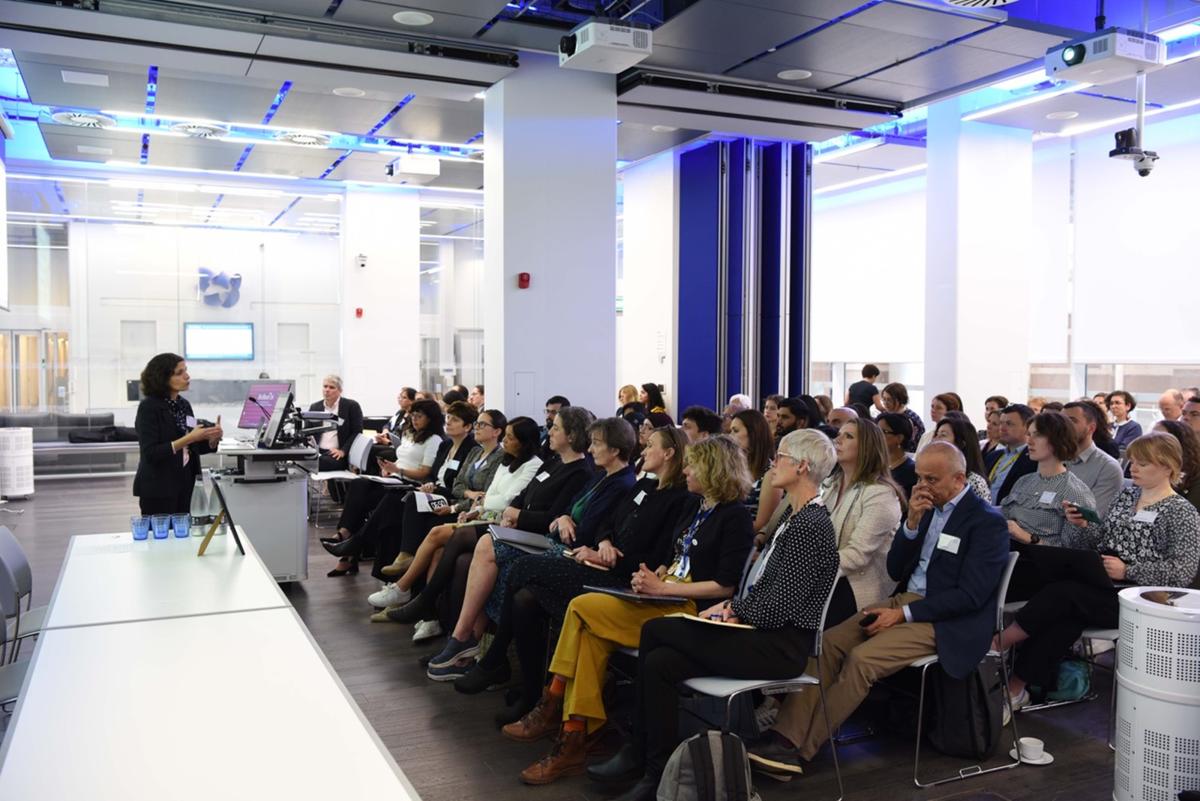Guest blog post by Molly Andrews, UK Dementia Research Institute; Priya Kalia, SciTribe; Miranda Weston-Smith, BioBeat
“There is an urgent need for innovative solutions and investment in the accurate diagnosis of neurodegenerative disease, and the development of effective treatment options.”
Professor Zoe Kourtzi, Professor of Computational Cognitive Neuroscience, University of Cambridge

Professor Zoe Kourtzi delivering the keynote at the Sainsbury Wellcome Centre
Every 3 seconds, someone in the world is diagnosed with dementia - with 55 million people living with dementia. Neurodegenerative disorders are a global challenge - and in the UK are the leading cause of death, with the cost of dementia in the UK in 2024 estimated to be £42 billion. It’s no surprise that digital solutions within the field of neurodegeneration are currently exploding as a consequence. The BioBeat24 half-day event, held at the Sainsbury Wellcome Centre in central London in May 2024, was all about exploring emerging opportunities both from research and clinical perspectives as well as understanding the fundraising environment for entrepreneurs. It was organised and hosted by Miranda Weston-Smith of BioBeat in collaboration with the UK Dementia Research Institute (UK DRI).
Pioneering digital solutions for neurodegeneration
A fantastic keynote speech by Professor Kourtzi set the scene for the meeting by outlining the growing challenge of dementia. She discussed applying AI to group patients into different disease types early and precisely – and how AI could play a central role in revolutionising the early prediction and detection of dementia, especially with up to half of all people affected by dementia being undiagnosed, and around a third being misdiagnosed.
Next, there was a discussion on emerging digital solutions for neurodegeneration, with Dr Alison Cave, Chief Safety Officer at the Medicines and Healthcare products Regulatory Agency (MHRA), chairing the expert panel. She urged people consider both benefits and cost of treatments and that we be mindful of addressing health inequalities. Dr Cynthia Sandor, Group Leader at the UK DRI at Imperial, began the conversation by talking about the role of digital biomarkers in early diagnosis alongside biological ones. Dr Francesca Cormack, Chief Scientist at Cambridge Cognition, discussed developing accurate digital cognitive tests, the challenges associated with this and human considerations for adopting digital assessments.
Sarah Daniels, Health and Social Care Lead at the UK DRI Centre for Care Research & Technology, introduced the work that she and others at the Centre are spearheading to integrate technology within the social care system, using smart tech to monitor and support people living with dementia to remain within their own homes for longer. Unintrusive technology such as sleep mats and door sensors are being trialled in the homes of people with dementia, through the Minder study Sarah was joined on the panel by Delia Madden, a participant in the trial who cared for her Aunt Loveday. Delia shared a moving account of how Minder technology enabled her to look after her Aunt Loveday, who was able to remain at home throughout her illness.
Neurodegeneration and the next ‘Big thing’ in investment
Jia-Yi Har, Partner at Cathay Health, chaired the dynamic second panel discussion. She stressed the importance of recognising that, unlike other tech software products, digital health solutions require longer development timelines due to the necessity of generating clinical evidence and navigating regulatory hurdles. She also pointed out the critical need to understand a company’s clinical adoption drivers and go-to-market strategy, particularly as they start raising second and third-round funding. Despite these challenges, the potential for early revenue generation makes this an interesting and attractive space for investors. Julie Simmonds, Managing Director and Research Analyst in Healthcare at Panmure Gordon, highlighted the importance of companies continually demonstrating progress and being in a favourable market in which to generate revenue. An established reimbursement pathway is also seen as very attractive for investors.
Inga Deakin, Principal at venture capital company Molten Ventures, emphasised that investors need companies to deliver results. She explained that partnering with pharmaceutical companies to inform clinical trials for novel therapeutics, for example through patient stratification models and services, can act as a catalyst for developing a sustainable business model. Samana Brannigan, Head of Health Technologies at Innovate UK, discussed projects in digital neurodegeneration it has funded. Meanwhile, Caroline Cake, CEO and Co-founder of Neu Health, walked through the unique challenges companies face in demonstrating their value and Return on Investment (ROI). She emphasised the importance of not only calculating the cost of the solution but also including the costs incurred when the solution is not adopted, to reflect its true ROI more accurately. Additionally, she stressed the crucial need to identify NHS budget sources and systematically target them. Tina Marshall, VP Strategic Accounts, IgniteData, and former Head of Commercial at Akrivia Health, advocated pinpointing and exploiting a niche profitably.
Planning, planning, planning commercial strategy
One repeatedly echoed point was that health systems such as the NHS do not want to deal with many vendors; therefore, companies need to be able to offer additional products and services over and above their primary product and aim to be one of these few vendors. The sales team becomes a key part of an investor’s due diligence. These are the teams that need to convince hospitals why they should buy the digital solution.
Novel therapies on the neurodegenerative disease horizon
With rising costs associated with dementia and upcoming initial disease-modifying treatments under consideration by the EMA and MHRA, the demand for early diagnosis, patient stratification and disease progression monitoring is likely to increase drastically. Digital solutions will make disease detection that much easier, leading to exponential growth in the patient base. Digital neurodegeneration solutions currently in development, in clinical testing, and undergoing approvals are therefore well-placed to help address and meet the anticipated demand.
We are very grateful to support from Appleyard Lees, Covington, Innovation Forum, One Nucleus and the Sainsbury Wellcome Centre.
*If you would like to submit a guest blog post to One Nucleus, please email [email protected]